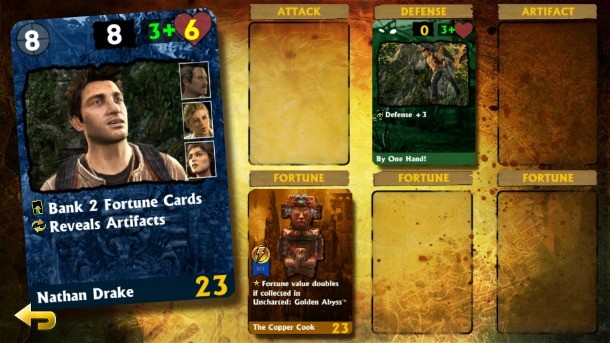Please support Game Informer. Print magazine subscriptions are less than $2 per issue
Uncharted: Fight For Fortune Impressions

Combining the characters and world of the Uncharted series with a competitive card game seems like a strange pairing, but that’s exactly what Bend Studio and One Loop Games did with the turn-based card game, Uncharted: Fight for Fortune.
As strange as it is seeing characters like Drake, Victor Sullivan, and Elena Fisher on digital trading cards, Fight for Fortune integrates the Uncharted world into the game adequately enough. It doesn’t add anything to the overall experience of the game, but it doesn’t detract from it either. Matches are played using only the touchscreen, which works as it should, but it’s a little strange not having the option to use a button control scheme.
The objective in Fight for Fortune is to bring your opponent’s health down to zero. This can only be accomplished by attacking your opponent directly. If there is an opposing card in the slot across from your attacking card, your opponent’s card takes the damage and the other player’s health remains unchanged. Each player has five slots in which to place a card from one of three Factions: Heroes, Villains, or Mercs. Point values are associated with each Faction, and those points must be spent to play a card.
This is where the strategy of the game emerges. Each player usually begins a match with about two or three points per each Faction. Pending any effects that other cards may have on the game, those Faction point values increase by one after each turn. Some cards can be played at the cost of one or two Faction points, but those cards will probably have low health and low attack values. It becomes a game of risk and reward. One of the Nathan Drake cards has a good attack and high health, but it costs 8 Faction points to play, so do I wait until I have enough points to play that card at the risk of being defenseless, or do I play an affordable card that’s weaker?
After a while you learn how to start balancing the cards you’re playing. Maybe you just keep playing weaker cards from your Merc and Villain Factions while you accumulate points to play a powerful Hero card, or maybe you try to do some quick damage by playing low cost cards from each Faction. The game allows players to build their own strategies.
Building up Fortune is another important aspect of each match. Fortune cards can be exchanged for points to get resources such as shotguns, which increase a card’s damage, or vests, which improve a card’s health. A Fortune card can be instantly banked for five resource points, or you can take a risk by attaching it to one of your cards currently in play and banking it at a later time for the full value. However, if your opponent destroys the Faction card that is holding the Fortune, the full point value of that card is transferred to them.

There are multiple facets to keep track of during a match. It can seem like a little too much to at first, but Fortune Hunter, the game’s single-player mode, does a nice job of easing players into the various systems. I felt a little confused during my first match, but I had a concrete grasp on everything after completing a few more.
The game doesn’t appear to be very complex after you learn the basics, but there is actually a good amount of depth in Fight for Fortune’s mechanics. The momentum of a match can turn on a dime if the right card is strategically played at the right time. There were times when I thought defeat was inevitable, but I was able to shift the tides of battle by making the right moves at the perfect times.
The possibility of a quick comeback helps keep the matches interesting enough throughout, but there are also times when a fight is so one-sided that you’re just going through the motions, waiting for the health counter to hit zero.
Fortune Hunter pits the player against a series of characters from the Uncharted universe, with the opportunity to unlock a new card after attaining victory. The match objectives are changed up every once in a while, but overall most of the matches differ only in difficulty. Matches can be paused or saved at any time, which is essential for anyone playing this game on the go. Fortune Hunter is fun in small bites, but long play sessions can become monotonous, even when the game tries to change things up a bit. Fight for Fortune has a deck builder feature as well, but custom decks cannot be used in Fortune Hunter.
There are two ways to play multiplayer: Pass and Play with a single Vita and asynchronous online multiplayer. Pass and Play is exactly what it sounds like; one person makes their move and then passes the Vita to the person they’re playing against. The online multiplayer is a nice mode for people that don’t have friends in the vicinity to play with, but I was constantly receiving matchmaking errors during my attempts to find a game.
Uncharted: Fight for Fortune is a competent card game. Outside of the online multiplayer there aren’t any glaring issues with the gameplay. The rules are easy to pick up and offer enough depth to keep the game interesting, there are plenty of unlockable cards, and the game caters to people with short attention spans. Just be sure that a turn-based card game is exactly what you’re looking for before you buy it.










